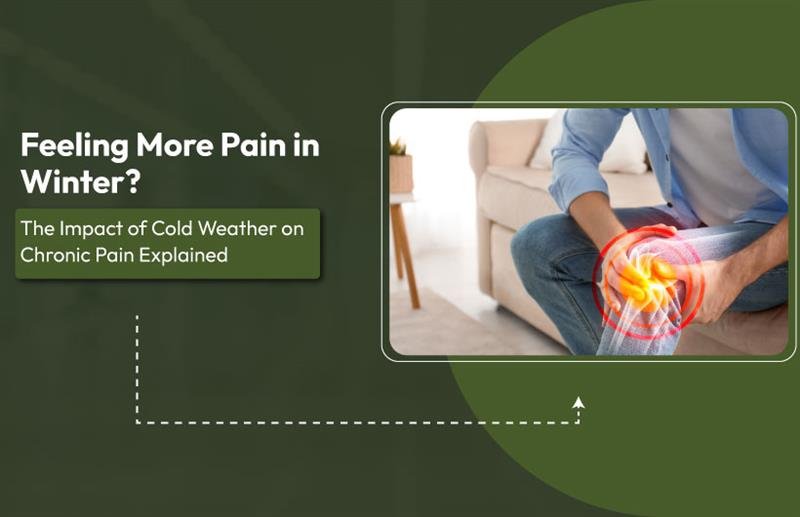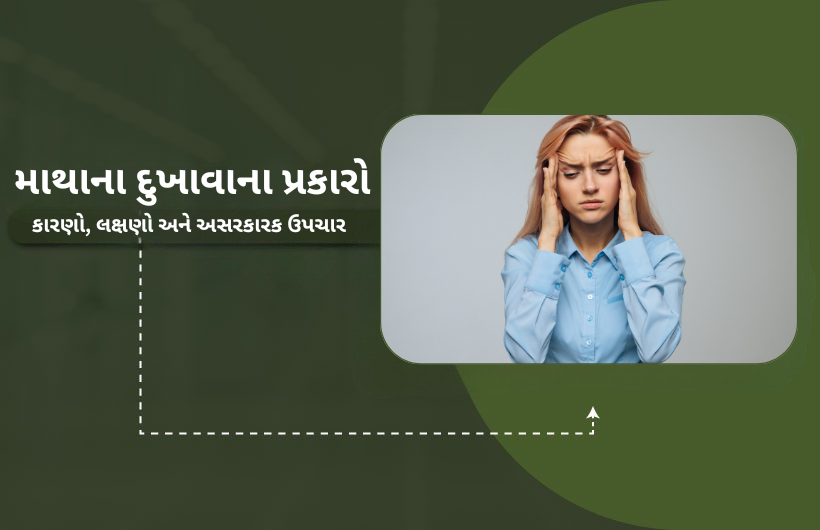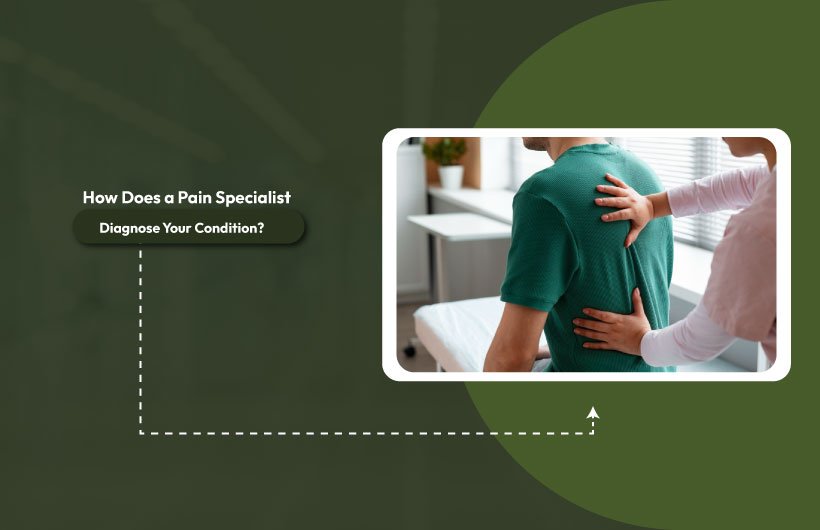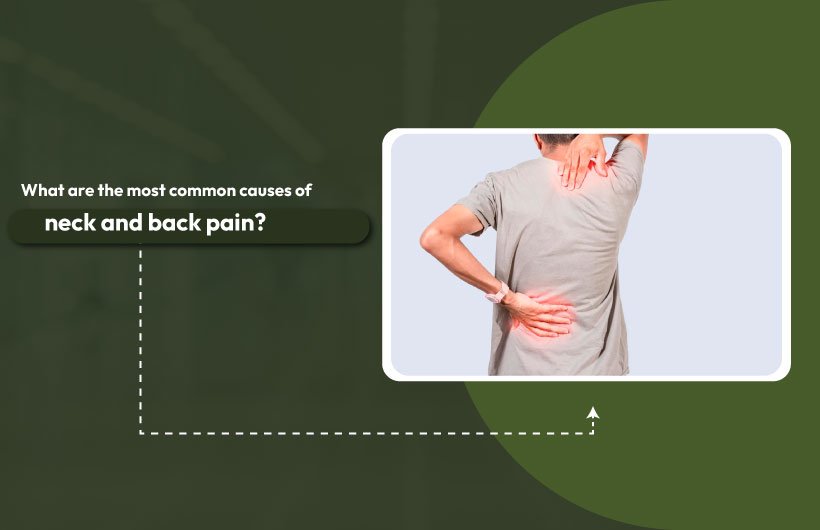Are your joints or back hurting more as the temperature drops? You’re not alone. Many people living with chronic pain conditions, such as arthritis, fibromyalgia, or old injuries, often notice increased discomfort and stiffness during winter. While cold weather doesn’t directly cause pain, it can make managing it more challenging. At our Pain Management Clinic in Ahmedabad, we help you understand why this happens and provide effective strategies to stay comfortable and active even in the colder months.
Why Does Cold Weather Make Chronic Pain Worse?
When temperatures fall, the body reacts in several ways that can trigger or worsen pain. Here are some common reasons behind the increase in discomfort during winter:
- Changes in blood circulation: Cold weather causes blood vessels to constrict, reducing blood flow to muscles and joints. This lack of circulation can make tissues tighter, leading to stiffness and pain.
- Drop in barometric pressure: A decrease in air pressure during winter can cause tissues to expand slightly, creating pressure in joints, especially in those affected by arthritis or old injuries.
- Muscle tension: Many people unconsciously hunch or tense their shoulders to stay warm, which can lead to muscle fatigue and discomfort.
- Reduced physical activity: Cold weather often discourages people from moving around or exercising, which can make joints stiff and worsen chronic pain over time.
- Mood changes: Lack of sunlight in winter can affect your mood and energy levels, making pain feel more intense.
According to Dr Megha Shah, a leading Chronic Pain Specialist in Ahmedabad, winter weather can act as a trigger for people already struggling with chronic conditions. She explains that understanding your body’s pain patterns and staying proactive with treatment can make a big difference in managing symptoms effectively.
How Can You Manage Chronic Pain in Winter?
Managing chronic pain in winter requires a mix of physical care, warmth, and lifestyle adjustments. Here are some practical and effective ways to find relief during the colder months:
- Keep your body warm
- Dress in layers to trap body heat.
- Use gloves, socks, and scarves to protect joints like knees, wrists, and neck.
- Try using a heating pad or warm compress on painful areas for 15–20 minutes.
- Stay active
- Gentle exercises such as yoga, stretching, or walking indoors can keep your joints flexible.
- Avoid long periods of sitting. Get up and move every 30 minutes.
- Swimming in a heated pool can also reduce stiffness and ease muscle pain.
- Maintain a healthy diet
- Include anti-inflammatory foods like turmeric, ginger, green leafy vegetables, and omega-3-rich fish.
- Stay hydrated even in winter to keep joints lubricated.
- Limit processed foods, sugar, and caffeine, as they can increase inflammation.
- Get enough sleep
- A warm, cosy sleeping environment can help muscles relax and reduce pain flare-ups.
- Maintain a consistent sleep routine for better rest and recovery.
- Manage stress and mood
- Chronic pain can worsen with stress or low mood, which are common in winter.
- Practice deep breathing, meditation, or mindfulness to calm your mind.
- Spend time outdoors in sunlight or near a window to boost Vitamin D and mood.
- Use heat and cold therapy wisely
- Warm showers or baths can relax muscles.
- If swelling is present, use a cold compress to reduce inflammation.
- Consult a pain specialist
When home remedies aren’t enough, consulting a qualified specialist is the best step forward. Pain management specialist Dr. Megha Shah, at Anamay Pain Clinic in Ahmedabad, helps patients manage chronic pain using advanced, personalised treatments. Whether it’s nerve pain, arthritis, or joint discomfort, she focuses on long-term relief through safe, evidence-based care.
What Are Common Cold-Weather Pain Triggers?
Winter can affect different parts of the body depending on your underlying condition. Here are some common cold-weather pain triggers and how to manage them:
- Arthritis and joint pain: Cold and damp air can make joints feel stiff and sore. Keep yourself warm and move regularly.
- Back pain: Chilly weather may cause muscle tightening, leading to lower back pain. Gentle stretching and posture correction help.
- Fibromyalgia: People with this condition may experience more fatigue and widespread body pain in winter. Maintaining a regular sleep and exercise routine is essential.
- Old injuries: Areas affected by past fractures or surgeries may ache more in cold conditions. Heat therapy can provide quick relief.
- Nerve pain: Cold air can irritate nerves, especially if you have diabetic neuropathy or sciatica pain. Wearing proper footwear and keeping extremities warm is crucial.
Dr. Megha Shah often emphasizes that understanding these Cold Weather Pain Triggers allows patients to prepare better and prevent flare-ups. Identifying what makes your pain worse, such as sudden temperature changes, sitting too long, or skipping medication, can help you stay in control during winter.
When Should You See a Chronic Pain Specialist?
If your pain becomes severe, affects your sleep, or limits your daily routine, it’s time to seek professional help. A Chronic Pain Specialist in Ahmedabad, like Dr. Megha Shah, can diagnose the root cause and recommend targeted treatments such as:
- Pain injections
- Physiotherapy guidance
- Nerve block procedures
- Radiofrequency ablation
- Lifestyle and exercise recommendations
At Anamay Pain Clinic, the focus is on providing holistic and minimally invasive solutions to reduce pain and improve quality of life. The clinic offers individualised care to help patients manage chronic pain effectively, even during the challenging winter months.
Can You Prevent Winter Pain Altogether?
While you may not be able to completely avoid cold-weather pain, you can reduce its impact by staying proactive. Here are a few preventive tips:
- Plan your day to include movement breaks and stretching.
- Keep your home warm and free from drafts.
- Don’t ignore early signs of stiffness or discomfort; address them immediately.
- Continue prescribed medications and treatments even when symptoms seem mild.
- Maintain a positive mindset and focus on activities you enjoy.
Final Thoughts
If winter-related pain is affecting your life, consulting Dr Megha Shah at Anamay Pain Clinic can make a significant difference. With her expertise in the Role of Pain Management and patient-focused care, she helps individuals regain mobility, manage pain effectively, and lead a more active, comfortable life even during the coldest months.








